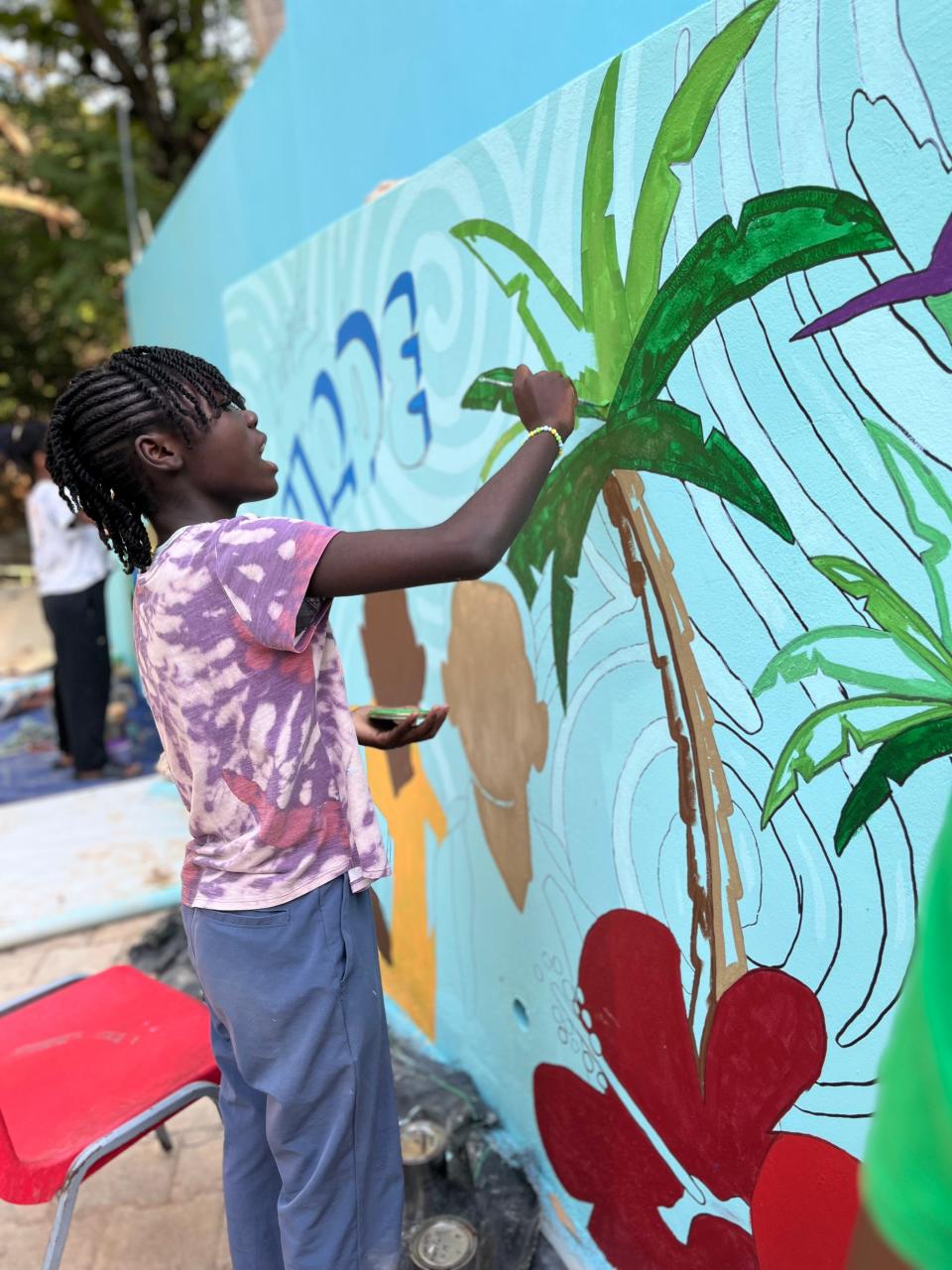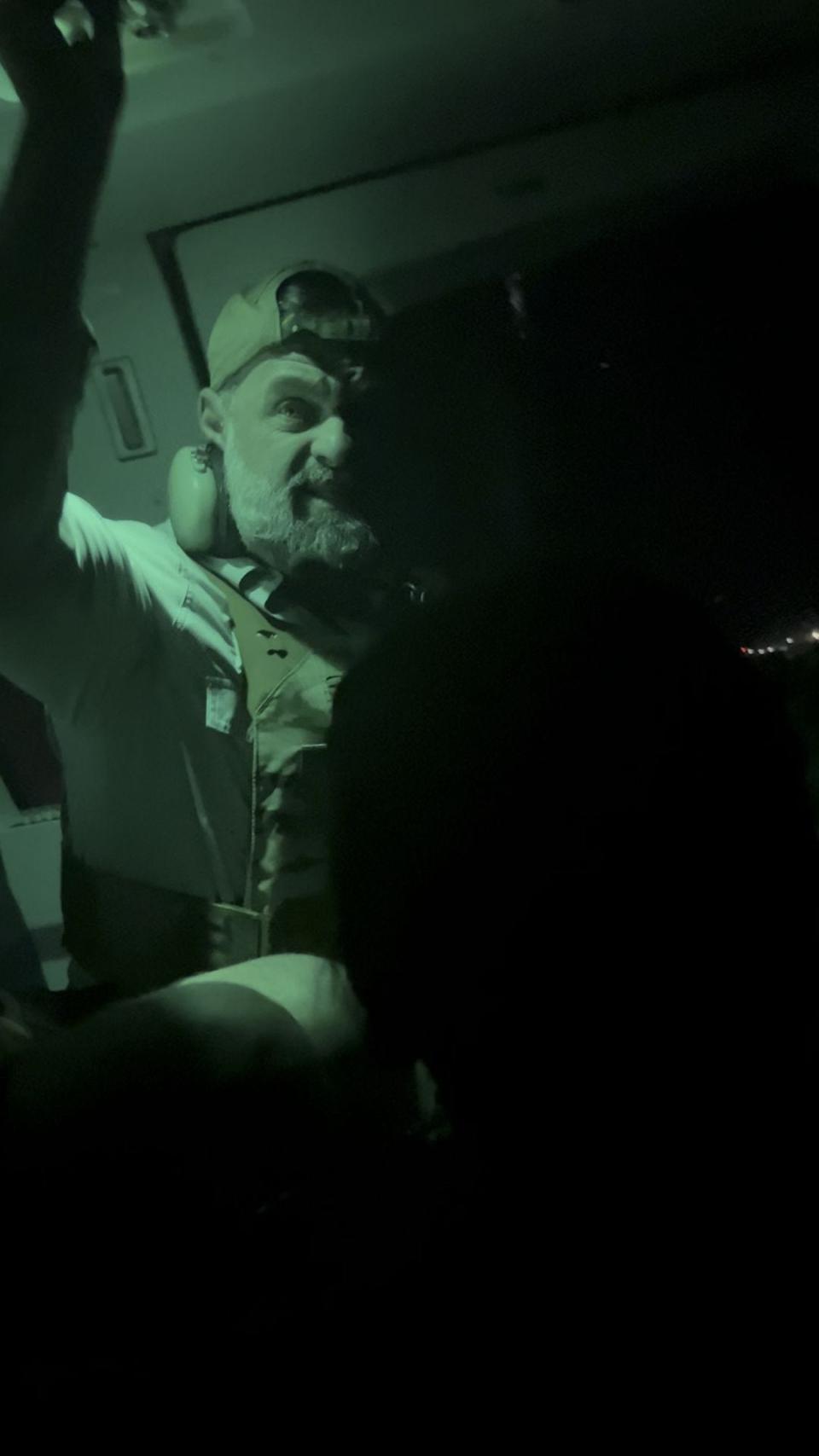Mitch Albom's harrowing escape from Haiti reminds us: Don't count on embassy rescue
- Oops!Something went wrong.Please try again later.
- Oops!Something went wrong.Please try again later.
Mitch Albom and Janine Sabino have made it home from Haiti, and I have no plans to go.
My friends are safe. I don't need to keep thinking about the most downtrodden nation in our hemisphere, or about how we helped make it that way, or whose responsibility it is to get Americans the heck out of there.
But I am, especially that last part ― and to what I suspect is yours and my mutual surprise, it's not the U.S. State Department.
Assisting with emergencies is “the highest state of what we’re there for,” said University of Michigan professor Susan Page, the first U.S. ambassador to South Sudan from 2011-14.
But be forewarned, she said, that "no embassy can protect everyone,” and the staff’s role is to dispense lawyers and information, not dispatch Marines.
Fortunately, Janine and her husband, Mitch, the Free Press columnist and wildly popular author, found a path home ― a trail that started with U.S. Rep. Lisa McClain, R-Bruce Township. McClain did splendid work, and if she blamed the situation on the White House ― which also can't realistically do as much as people might think ― that's just the political world we live in.
Eight other evacuees in a faltering helicopter had come with Janine and Mitch to volunteer at the Have Faith Haiti Mission. He founded the orphanage after the 2010 earthquake that killed 3% of an already beleaguered population, and the couple does not simply send checks, though you are welcome to.

Mitch is on-site every month, hugging kids and swinging hammers. It's an increasingly precarious trip, and this month's turned out to be the most treacherous. As the volunteers hunkered down, a loose coalition of lethal, heavily armed gangs freed 4,000 prison inmates, closed the airport in the capital of Port-au-Prince, and essentially locked out President Ariel Henry, who has been stuck in Puerto Rico for weeks.
Henry has promised to resign as soon as a transitional council is appointed to replace him, a vexing challenge. In Haiti, it's chaos as usual.
Revolutionaries like us
Haiti has been a country for 220 years, and it's still waiting to catch a break.
In the 1700s, it was a French colony called Saint-Domingue, and it was somewhere between a cash cow and a gold mine. Sugar, coffee and other marketable products made the western portion of Hispaniola the best little spot on Earth to exploit slave labor.
In 1791, the slaves expressed their indignation with a revolt, and against all odds, they ultimately won. This is very much a Cliffs Notes version of history, mind you, but by 1804, the French had been chased off. Haiti became the first independent Black-run republic in the world, and only the second free nation in the Western Hemisphere.
You would think the first free nation would say welcome to the club, but the United States had slavery issues of its own, and did not even recognize Haiti as a country until 1862. That was after the French popped up again in 1825, with a fleet of gunboats, to discuss reparations — not for the former slaves, but for the slaveholders and, to a lesser extent, the French government which had been deprived of further ill-gotten riches.
The French set the price of continued independence at the equivalent of $20 billion today, with annual payments of far more than Haiti's annual revenues. Haiti had to take out a loan from a French bank, a mortgage on freedom that was not paid off until 1947.
Instability was baked into the arrangement like butter in a croissant, and geography is not the only reason we should be aware of Haiti's recipe for disaster. Only two hours away by air, we're part of the reason it's in an eternal jam.
After the assassination of Haiti's president in 1919, an alarmingly frequent occurrence, 330 U.S. Marines marched into Port-au-Prince and took over, the better to watch out for American business interests. We stayed for 15 years and continued to control Haiti's finances for another 13, paying ourselves a tidy fee.
Come the late 1950s, we supported murderous president-for-life François "Papa Doc" Duvalier and then his son, Jean-Claude "Baby Doc" Duvalier, on the theory that they may have been vile killers, but they weren't communists.
Today, the gangs of Port-au-Prince, more like Mafia families than street hoodlums, carry weapons imported from the U.S. through streets still battered by a major earthquake in 2021. The even more catastrophic quake 11 years earlier killed at least 100,000 people.
Factor in periodic flooding and at least nine fatal hurricanes since 1994, and this is a nation that needs help from Mitch and Janine and anyone else with the good heart and strong back to go. And, the nerve.
Level 4: stay home
Haiti has been on the State Department's list of Level 4 destinations for the past four years.
In short, that means "Do Not Travel," the same advice the government gives for Afghanistan, Iran, Russia, Ukraine and Gaza. At length, there's a 622-word explanation that begins, "Do not travel to Haiti due to kidnapping, crime, civil unrest, and poor health care infrastructure."
Some of the estimated 1,000 U.S. citizens there at the beginning of March are married to Haitians or were visiting family. If any are there to smuggle guns or do other shady business, they can swim home.
Most of the rest were like the Have Faith Haiti Mission team, trying to do good and taking a manageable risk that suddenly spun out of control.
In a riveting column two Sundays ago, Mitch told of connecting by phone with McClain, who reached out to Florida Rep. Cory Mills, who found a helicopter and crew across the border from Haiti in the Dominican Republic that arrived in dead of night at a location far enough from the orphanage to not put 60 children in the gangs' crosshairs.

"This is not an adventure story," he wrote, but rather a continuing tragedy, a frustration, and now a political talking point.
"That's the State Department's job, is to protect Americans abroad," McClain told the online Forbes Newsroom. "If they're unable to do that, why do we need to fund them?"
She noted that even as the embassy offered little help to the orphanage volunteers beyond stay-put-and-be-careful, it managed to evacuate its own nonessential personnel.
Exactly, Page said. The State Department brought those people to Haiti, and it is responsible for getting them out.
That's not to say tourists and others are on their own. Embassies keep track of them, find them legal help or loans if needed, and pass along what information there is to share, even when it's distressingly unchanged or unhelpful.
The piercing reality, though, is that Rambo is not on the embassy payroll, and presidents can't blithely put paratroopers in harm's way even when a gang kidnaps 16 Christian missionaries from Ohio, as happened in Haiti three years ago. What governments are best at is negotiating, but that requires someone to negotiate with.
“We always say the embassy is operating with limited resources and personnel, and we are unable to get to all places," said Page, who teaches at U-M’s law school and in the Ford School of Public Policy. "Make sure your own plans are up to date.”
In the past week, the embassy in Port-au-Prince has started organizing helicopter charters similar to the one arranged by Mills. Chartered airplanes from Florida have been lifting small groups of that state's residents out of Cap-Haitien, an airport on the north coast 120 miles from Port-au-Prince. Canada and France are evacuating what both call their "most vulnerable."
For Haiti, help is leaving, not coming.
Meantime, there is no functioning government, the gangs are only growing stronger, and hurricane season starts in June.
Reach Neal Rubin at NARubin@freepress.com.
To subscribe to the Free Press at discount rates, click here.
To submit a letter to the editor, visit freep.com/letters.
This article originally appeared on Detroit Free Press: Mitch Albom's Haiti escape reminds us: Don't count on embassy rescue

